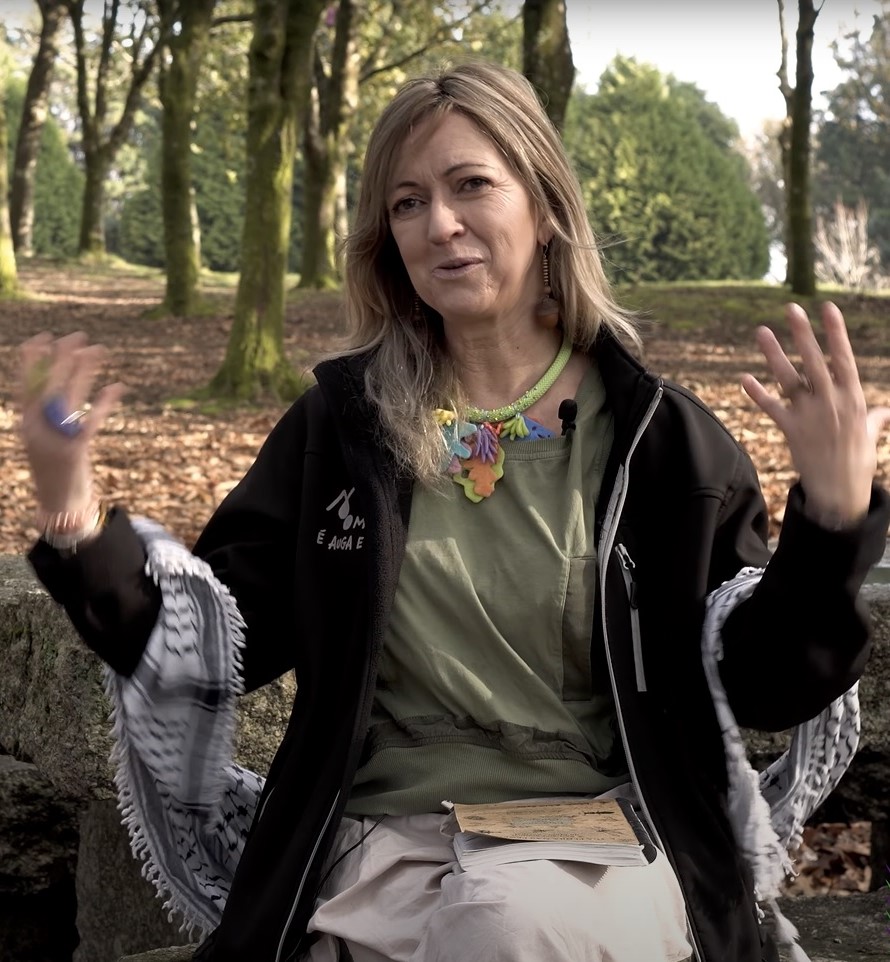
Iolanda Otero, member of the Comunidad de Montes Vecinales in Mano Común de Tameiga- Mos, Pontevedra
Iolanda is a member of the board of directors (Xunta Reitora) of the Comunidad de Montes Vecinales en Mano Común de Tameiga, ‘a forest park that we have for the use and enjoyment of our neighbours’. She decided to join together to confront the threat of a private company that ‘wants to take over our forest, to expropriate it, to build a large shopping centre and football pitches’. Before this conflict, she was a community member but did not participate actively; the possibility of losing the forest made her take the step to become a member of the Xunta Reitora. Her action was influenced by her emotional ties with the area, but also by the idea of starting up the environmental projects she had in mind, but which had been held up because the conflict had used up her time and economic funds.
‘Community forestry has a long history’, but ‘it is historically a very patriarchal world’, says Iolanda, who recalls that historically it was the men, as heads of the family, who held the important management and decision-making positions because they were the community members. While it was the women who did the work in the fields and ‘looked after the rural areas, the forest and the land’, it was the men who made the decisions and participated in the assemblies.
Women’s participation has been limited due to social structures that prioritise family responsibilities to the detriment of women’s community life. ‘Assemblies were held on Sunday mornings, when women were busy preparing family meals,’ she explains, underlining how the system perpetuated women’s exclusion. Although the percentage of women participating in her neighbourhood council has increased dramatically in recent years, to 33-34%, and two women on the board (secretary and treasurer, herself), this change has involved a lot of awareness-raising.
Since joining the board, Iolanda has fought to promote women’s participation in key community decisions. ‘We need more women on the councils and in the assemblies; their participation is essential,’ she says, stressing the importance of achieving parity.
Despite progress, women face structural barriers to equal participation. The lack of equal sharing of care work limits the time they can devote to community management. According to Iolanda, ‘meetings are often held at times that exclude many women, and we ourselves continue to bear the burden of domestic responsibilities’. This reality perpetuates inequality, even in spaces that claim to be inclusive.
The effort to make women’s work visible also encounters resistance in the power dynamics within communities. ‘A woman’s word does not have the same value as a man’s,’ says Iolanda, explaining that women’s opinions have to be validated by studies or positions in order to be heard. This disadvantage not only affects their influence on decisions, but also their motivation to get involved in leadership roles.
Despite these challenges, Iolanda considers their participation in social movements essential and in fact thinks that ‘in the mobilisations, the majority are women; the majority of those who mobilise and participate in the struggles are women’, which has to do with the tradition of women’s mobilisation in her area, but also with the fact that they were the ones who cared for the bush and worked the farmland, but the decision-making spaces, such as the assemblies, were in the hands of men.
‘It is exhausting, but seeing the community united makes all the effort worthwhile, it compensates for the sacrifices you make,’ she reflects.
Iolanda states that ‘the policies that are being implemented are far from attracting the population to local trade, fairer trade and self-sustainability. They are pushing us towards the cities. Rural areas are only promoted in theory, but not in practice. ‘I think there should be policies that are more respectful of the environment, that allow people to live in their natural environment, with more real support, without macro-projects that are destroying everything’, and concludes by saying that ‘what I would most like is for more women to be incorporated into the communities, for there to be many more women presidents of neighbourhood forest communities, much more female presence’.
